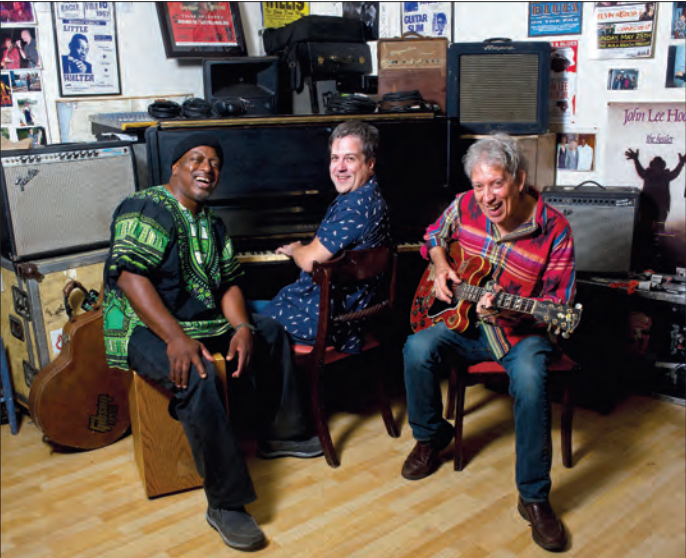The Blues Route: Elvin Bishop

It was more than 50 years ago when a young man, who grew up first on a farm in Iowa, then in Tulsa, Okla., came to Chicago armed with a college scholarship and a guitar. He’d spent many hours learning how to play blues licks on that machine and, now, he was going to be in the place where his favorite music came from. Elvin Bishop, later nicknamed Pigboy Crabshaw, was in hog heaven.
“Blues wasn’t especially popular where I lived,” says Bishop, now 74. “[The races in] Oklahoma were strictly separated. The radio was the only way that a white guy was gonna be exposed to it. I really just went crazy for it.”
Even when he arrived in Chicago, Bishop found that it wasn’t all that easy to go out and hear blues, “unless you went to the ghetto, which about 99.9 percent were not willing to do.” Bishop was willing, though, and he discovered that the older, established black bluesmen were “amazingly friendly and supportive. If you go into it with a good attitude, you make friends with people.”
Bishop got to sit in with many of his heroes, and by the mid-‘60s he’d met other aspiring blues players who shared his enthusiasm. The Paul Butterfield Blues and, led by its namesake on vocals and harmonica, became all the rage around Chicago, and their fame quickly spread. The group, which featured the twin guitars of Bishop and Mike Bloomfield, became regulars at the Fillmore Auditorium in San Francisco, at New York clubs and at folk festivals—like the one in Newport in 1965 where a couple of their guys backed Bob Dylan for his game-changing, controversial electric set.
The Butterfield Blues Band signed to Elektra Records and their self-titled debut album, followed by the landmark, progressive blues-jazz juggernaut East-West, established them as one of the most important and influential bands of the era. “It was a pretty amazing thing,” Bishop says about being involved with the band. “[The success] really wasn’t anything that anybody predicted or expected. We just wanted to be like the guys we loved—our heroes like Muddy Waters, Little Walter, Howlin’ Wolf and Buddy Guy.”
When Bloomfield left to form The Electric Flag in 1967, Bishop’s role was elevated. He stuck with Butterfield—the band, including Bishop, is now enshrined in the Rock and Roll Hall of Fame—for two more albums, but then decided it was time to go off on his own. He relocated to the Bay Area—“The weather is nice and everybody was in tie-dyed T-shirts and all friendly,” he says—and put together The Elvin Bishop Group, melding a modern soul sound with his beloved blues. The band played the local clubs and ballrooms of San Francisco regularly, and recorded their first album for promoter Bill Graham’s short-lived Fillmore label.
Bishop’s popularity grew, although he never attained mega-stardom. Then, in 1976, the strangest thing happened: “Fooled Around and Fell in Love,” a song Bishop wrote— released by Capricorn Records under his name but featuring the vocal of Mickey Thomas— became a hit. A huge hit: It reached No. 3 nationally. It was, by any measure, a pop-rock song, although the blues was still at its core. Rather than capitalize on it, Bishop just went back to doing what he had always done: playing and singing funky, good-time groove music informed by the blues.
And that’s what he’s still doing, more than 40 years and 20-some albums later. His newest, Big Fun Trio (Alligator Records), is as good as any that have come before it, but this one’s got a new twist. For this project, Bishop puts aside his regular full band to get back to the basics. With just Bob Welsh playing guitar and piano, and Willy Jordan on cajón (a box-shaped hand drum) and vocals, Bishop—on guitar and vocals, of course— rams through a dozen solid blues tunes, several of his own and a handful of well-chosen covers. It’s raw and simple, and utterly endearing. Three harmonica players, including the legendary Charlie Musselwhite, sit in.
With Big Fun Trio, Bishop says, “I just wanted to do this other thing. I was surprised at how well it stood up with just the cajón, and no drums and no bass. Bob is a multitalented guy—he can make the guitar sound like a bass—and I had Willy on a couple of other recording projects, so it was easy to get together.”
The opening track on the album, Bishop’s own “Keep on Rollin’,” is his commentary on the state of the country. Pointed in its lyrical narrative but embedded with characteristic Bishop humor, he wonders if there’s even a difference between Congress and the circus, then deduces that they’re all “a bunch of clowns.”
The song, he says, “was written before the election, when everybody thought it was gonna go the other way, but I like it a lot because it represents the use of all our resources. We’ve got the harmony singing and Bob plays a hell of a piano part. In the middle, he switches over to playing the bass on guitar, and the whole thing works out pretty cool.”
Which is kind of how it’s always worked out for Elvin Bishop, ever since, as a young teenager, he heard Elvis Presley, Jerry Lee Lewis and Chuck Berry. “I loved that,” he says. “Then I found out that the parts that I liked about it were coming from blues.”
There was no turning back after that. He still has a devoted audience and is heading out on the road with the Big Fun Trio, as a duo with Musselwhite and with his regular band. And if, for whatever reason, the audiences should stop coming, “I’ll just sit on my porch and play,” Bishop says. Spoken like a true bluesman.




















